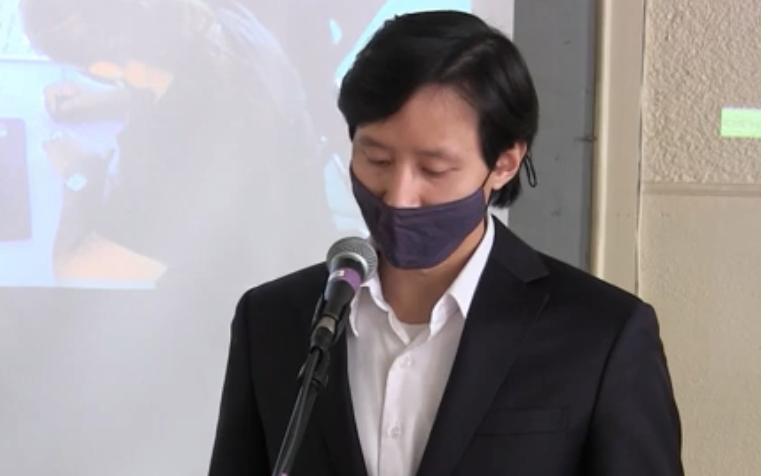Summary
The Thai community faces significant challenges in accessing quality healthcare, especially for undocumented immigrants. Affordable insurance, language barriers, and cultural differences hinder their access. Assembly Bill 1400 offers a solution with a single-payer system, providing comprehensive coverage and negotiating lower drug prices. It aims to improve accessibility and quality of care for Thai immigrants and other communities. Healthcare is advocated as a human right, and support for AB1400 is urged to ensure equitable healthcare for all Californians.
Transcript
My name is Panpavin Harabat, and I am the Policy and Planning Associate at the Thai Community Development Center, or Thai CDC. For 27 years, our organization has worked to address the multifaceted needs of Thai immigrants in the Los Angeles area. Many of these Thai immigrants are undocumented, low-income, and lack access to quality employment, which poses a significant threat to their ability to access quality healthcare.
For example, 69% of Thais have reported lacking health insurance because they cannot afford it, do not work for employers providing health insurance benefits, or do not qualify for medical or other public assistance programs, often due to their immigration status. Additionally, factors such as language barriers, cultural differences, and the high costs of medications further inhibit Thais from accessing timely and effective care when needed.
Consequently, nearly 50% of Thais have reported fair or poor physical health, and 63% have reported suffering from at least one chronic disease. The COVID-19 pandemic and resulting economic crisis have only amplified these health concerns and laid bare the glaring gaps in health coverage for immigrant communities under our current multi-payer healthcare system.
To illustrate the human toll of our current healthcare system on the Thai community and other Asian and ethnic communities, I’d like to share a story about one of Thai CDC’s clients who wishes to remain anonymous. His story holds value and is representative of what many undocumented Thai and ethnic immigrants face in terms of accessing quality healthcare.
He is an undocumented immigrant who has lived in California for more than five years. He works as a driver for a certain company and is living alone here in the United States. He did not have healthcare until two to three years later when he became Thai CDC’s client through a human trafficking case. Our legal team at Thai CDC enrolled him in a health program at Kaiser Permanente, where he pays $48 per month for healthcare and $12 for dental care.
However, his access to quality healthcare was not without challenges. One time, he had to talk to three or four nurses and had to wait three hours before he could see the doctor. Another time, he took his ex-wife, who was also an undocumented immigrant, to the hospital for kidney inflammation. She had to wait in a wheelchair in pain from 2 in the afternoon to 8 in the evening, without receiving any care. Luckily, they eventually met a Thai nurse who helped expedite the process so she could be treated.
Due to his limited English proficiency, he would always have to use either Google Translate or call a hotline to communicate with healthcare providers, which proved to be quite a difficult and burdensome task. More importantly, this whole experience made him feel undervalued and less important as a person.
Usually, to receive healthcare, he would have to travel from another county to L.A. County just to see a Thai-speaking doctor or a clinic that provides bilingual and bicultural services like the ones around Taitan. This journey takes up his time, money, and not to mention endangers him as he drives over if he’s sick.
Another critical issue worth pointing out is the exploitation that undocumented immigrants face when they become dependent on healthcare providers that offer language services. These providers may prescribe medication at extortionate prices or prescribe unnecessary medications, which can lead to side effects or other illnesses that the patient may not be aware of or may not be able to speak up about. For these reasons, undocumented immigrants undoubtedly face significant challenges and risks when it comes to accessing healthcare and quality healthcare.
Thai immigrants like him are in need of transformative change in our state’s broken healthcare system. Assembly Bill 1400 paves the way for a single-payer healthcare system that ensures comprehensive healthcare coverage for all residents, regardless of income, employment, or immigration status. This system will be free at the point of service and more conveniently accessible. CalCare will also be able to negotiate bulk drug prices for all Californians and take other measures to lower the cost of prescription drugs. Furthermore, CalCare aims to increase the delivery of language assistance and culturally appropriate healthcare services that effectively meet the needs of Thais and other ethnic communities.
Together, these changes in our healthcare system would bolster accessibility and quality of care for Thais and other immigrant communities of color throughout our state. Now, more than ever, CalCare is needed to guarantee quality healthcare as a human right for the most vulnerable populations. We are proud and honored to work together with all of you to support AB1400 and fight to advance healthcare justice for all Californians. Thank you very much.
